17 Healthy Morning Routine Habits Backed by Science

The way you start your morning can set the tone for the rest of your day. While reaching for your phone might seem like a convenient option, there are several compelling reasons why you should avoid doing so just after waking up. Instead, consider incorporating these science-backed healthy habits into your morning routine for a more positive and productive day ahead.
One Key to Success is to have Breakfast at the time of day most people have Lunch – Robert Brault
1. Invigorating Cold Shower

Did you know that taking a cold shower can trigger a surge of dopamine even greater than what you might experience from using cocaine? This natural mood booster can leave you feeling refreshed and energized for hours to come. Embrace the chilly cascade and reap the benefits throughout your day.
Also, the National Center for Biotechnology Information reports that cold water therapy can help improve sleep quality and reduce insomnia symptoms!
2. Task Bracketing for Increased Productivity
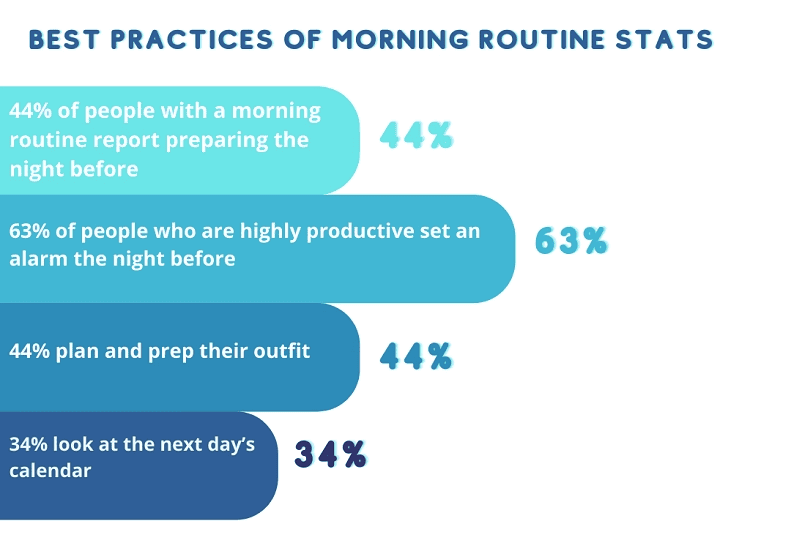
Facing challenging tasks can often be daunting, but by practicing task bracketing, you can make them more manageable. Approach these tasks as a series of steps, beginning before the task itself and concluding with the reward of its completion. This approach simplifies complex tasks, making them easier to tackle.
The Pomodoro Technique, which suggests intensely focused work for 25 minutes followed by a 5-minute break, has been shown to improve focus and productivity according to the NIH.
The Pareto Principle, commonly known as the 80/20 rule, suggests that roughly 80% of results come from 20% the effort, which highlights the importance of prioritizing tasks effectively.
3. Gratitude and Positivity with the Three Good Things Routine
Starting your day with a positive mindset can have a profound impact. Take a moment to reflect on three good things that happened the previous day and express gratitude for them. Whether it’s a beautiful sunset or simply the ability to breathe, this practice cultivates positivity and appreciation.
4. Mindful Breathing and Meditation
According to a survey conducted by the American Psychological Association, work-related stress is the leading cause of stress for adults, with 65% of respondents citing it as a significant source of stress.
Calm your mind and reduce stress by engaging in a 10-minute routine of guided breathing and meditation. This practice has been shown to alleviate anxiety and improve focus, providing you with a centered and composed start to your day.
5. Harness the Power of Sunlight
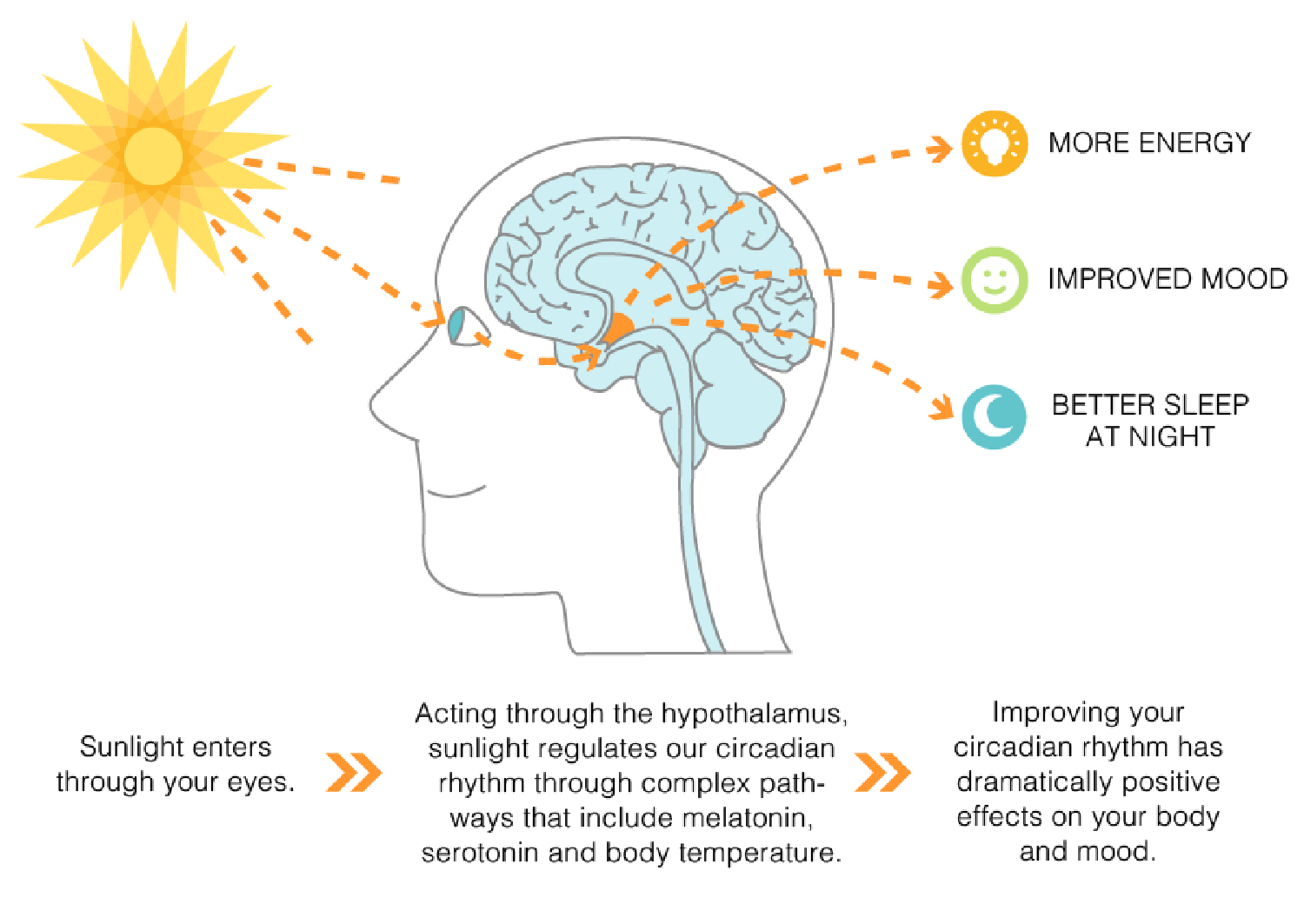
Expose yourself to natural sunlight in the morning to regulate your wake-sleep circadian rhythm. This exposure helps synchronize your internal body clock and enhances your sleep quality at night. A few minutes of sunlight can make a significant difference.
6. Savor a Cup of Coffee
For coffee enthusiasts, here’s good news: coffee, in moderation, can be a healthy addition to your morning routine. Scientific evidence supports its various health benefits. Limit your intake to a maximum of four cups per day, with the last cup consumed before 2 pm to avoid disrupting your sleep.
7. Musical Motivation
Music has the power to influence your mood and motivation. Curate a playlist with two or three songs that uplift your spirits and provide motivation during challenging moments throughout the day. Let the rhythm propel you forward.
8. Energizing Morning Stretches
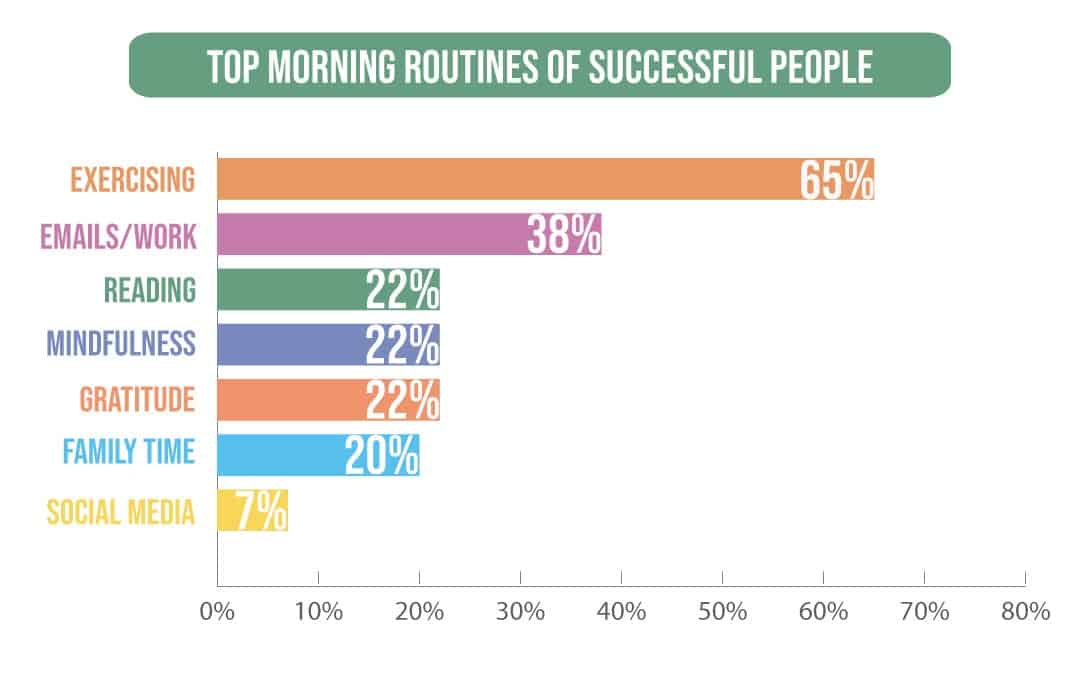
Allocate just 10 minutes to perform simple stretching exercises. This practice enhances flexibility, stimulates blood flow, and primes your body for the activities ahead, setting a proactive tone for the day.
A study published in JAMA Psychiatry found that regular exercise can reduce the risk of developing depression by up to 17%!
The International Journal of Environmental Research and Public Health has published research suggesting that morning exercise specifically increases serotonin and norepinephrine levels. This also reduces cortisol to lower symptoms of anger, tension, stress, fatigue or depression!
To make your Dreams come true, the first thing you have to do is Wake Up! – J.M. Power
9. Complete the Simple Task of Making Your Bed

The act of making your bed might seem small, but its benefits are noteworthy. Research suggests that completing this simple task provides your brain with a sense of accomplishment and sets a positive trajectory for the day, enhancing your overall mindset.
10. Create a Positive Morning Routine
Incorporate these science-backed habits into your morning routine to foster a positive and productive mindset. Avoid the immediate lure of your phone and instead, engage in activities that invigorate your body and mind. By embracing these practices, you can lay the foundation for a successful and fulfilling day ahead.
11. Process your Ruminating Thoughts
If something is troubling you, the morning is the best time to come up with solutions. Work on solving what concerns you and keeps you up, even a small step can help and give your brain the satisfaction of progress. Worries and problems should be addressed, but not at 3 am!
Take 10 minutes to write down your progress or solution you’re proposing for the current day, even a small step counts a lot. Writing it down helps it stick in your memory better than just thinking about it. In conclusion, easing our worries involves seeking solutions, giving them the real importance they deserve, and avoiding exaggeration.
This habit pairs well with practicing three good things. If it’s something you definitely can’t handle, it’s good to see a doctor or professional therapist, behavioral therapy has shown to be very effective.
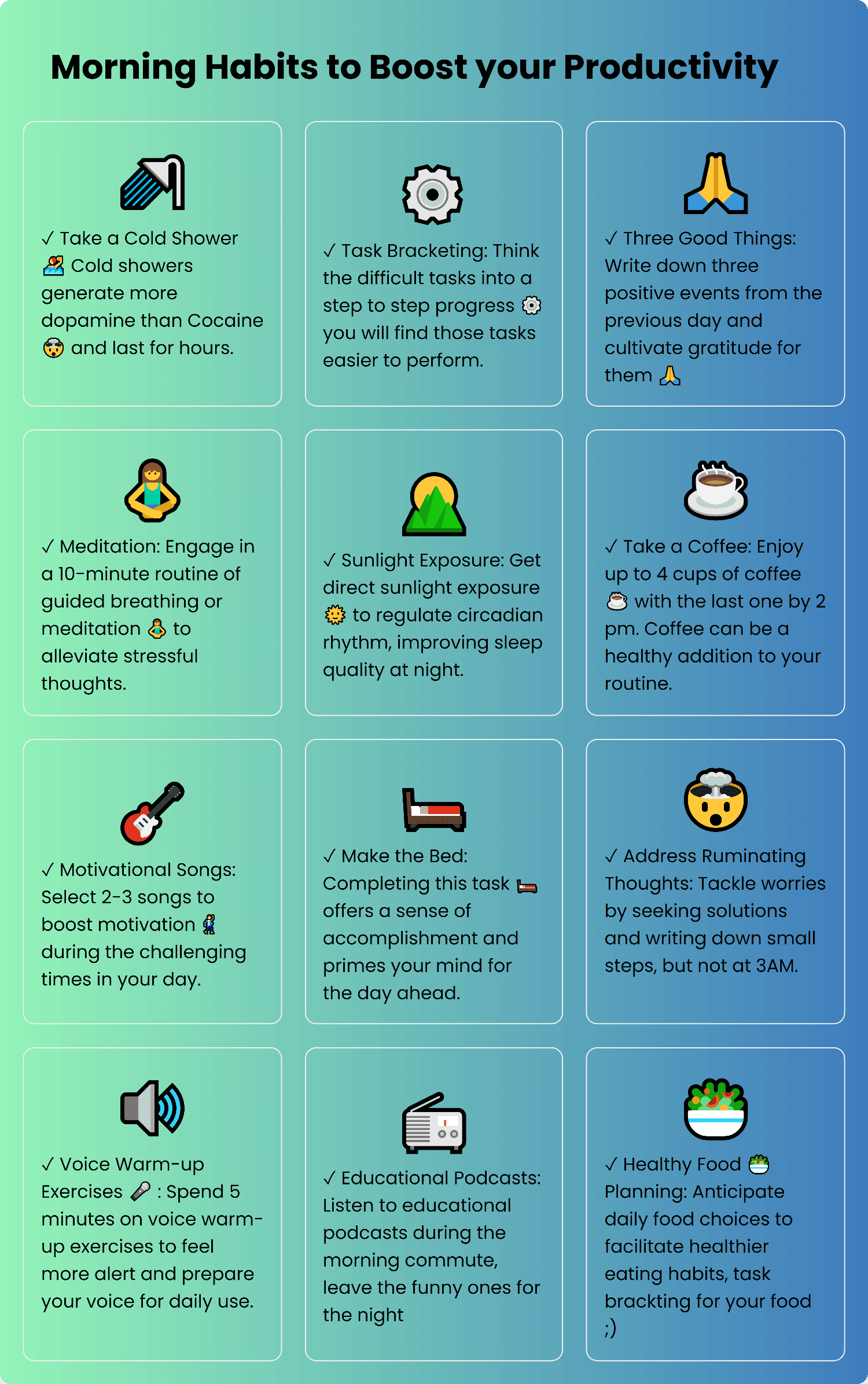
Poster created automatically with ByPeople Composer
12. Do Voice Warm-Up Exercises
It doesn’t matter if you’re not a speaker, singer, teacher, or a professional who uses their voice as a working instrument.
Your voice is a part of your body you’ll use throughout the day. A voice warm-up exercise takes no more than 5 minutes and can help you feel more awake. It prepares your voice for use during the day; the speech-involved muscles also need exercise.
13. Find an Educational & Uplifting Podcast or Video
In the morning, we have higher cortisol levels and are more ready to face the day. Look for an educational and uplifting podcast for your commute to work. If you’re learning a new language, it’s better if it’s in that language. Mornings are better for facing such challenges, making it a great time to listen to learning podcasts.
Conversely, more relaxed, curious, or funny podcasts are better saved for the afternoon, when we need to start relaxing for better sleep.
14. Think of Healthy Alternatives to the Foods You’ll Consume During the Day
Anticipating the whole process of a certain habit, specifically relating to the foods you’ll consume during the day, allows you to plan what you’ll eat more easily. You can prepare your mind to carry out these actions more easily throughout the day.
15. Practice Spaced Repetition
Spaced repetition is a well-studied and proven memorization and learning technique. There are different methods and apps for spaced repetition, but essentially, it involves repeatedly reviewing topics, words, or phrases with defined time intervals. It’s easier than it sounds and an excellent way to acquire more vocabulary, especially for language learning. The most famous app is Anki.
Remember, making a few intentional adjustments to your morning routine can lead to significant improvements in your overall well-being. Start your day with purpose and positivity, and you’ll likely notice the positive effects extending far beyond those early hours.
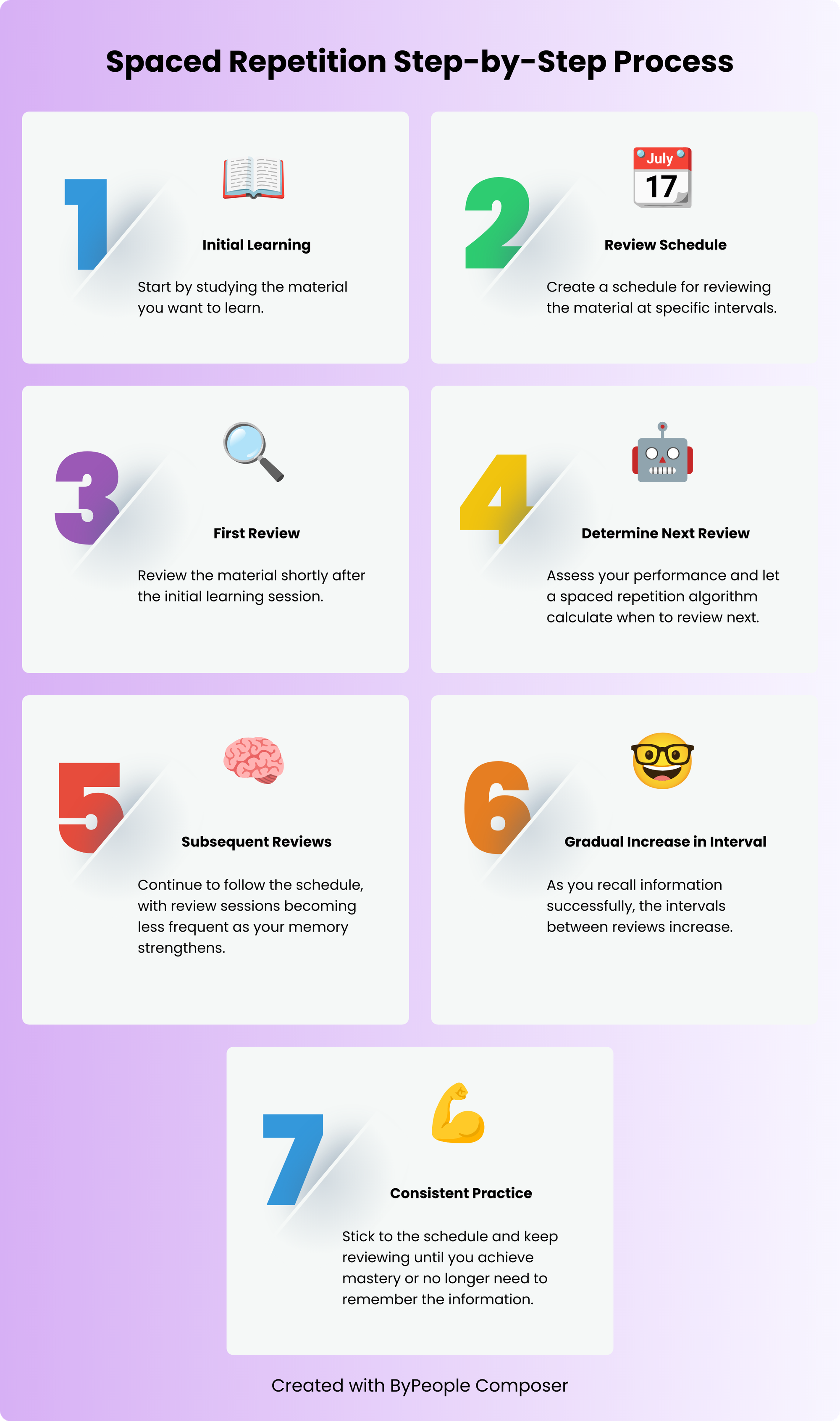
Infographic created automatically with ByPeople Composer
16. A Glass of Water Just After Waking Up
Just after waking up, we have a certain level of natural dehydration because we’ve gone approximately 8 hours without consuming any food or hydration, and in some cases, depending on the individual, we may have been breathing through our mouth for an extended period.
To address this dehydration that occurs upon waking up, it’s ideal to drink one or two glasses of pure water as soon as we get up, before consuming any other foods or beverages that can be harsh on this level of dehydration, such as coffee, for example.
Another advantage of drinking water in the morning upon waking up is that it doesn’t break the fasting and, on the contrary, it can create a feeling of satiety. With one or two glasses of water, we can slightly extend the time before having breakfast, thereby increasing the fasting period.
In general, fasting has been shown to have various health benefits, even a simple fasting period of 10/12 hours, although it’s ideal to attempt at least 14/16 hours for greater benefits.
Water in the morning can be combined with minerals to make it even more hydrating.
17. Wait at Least One Hour Before Getting Some Food
It is not advisable to consume food within the first hour after waking up, even if you are not practicing intermittent fasting. There is very good scientific evidence supporting the idea that at least for one hour, but even better if you can do it for longer, it is recommended not to eat anything after getting up, except for water or some minerals. Similarly, there is very good evidence in humans confirming that at least two or three hours before going to bed, we should not consume any type of food either.
Even if you are not rigorously practicing intermittent fasting, if you follow these two general rules, you will reap many of the benefits of fasting. This is because the natural fasting that occurs while we sleep will be much more beneficial by leaving these two windows of time without consuming food. Additionally, it will be easier to follow this type of fasting since it is not as restrictive and is more in line with our social rhythms. It should also be noted that data suggests people tend to abandon the practice of intermittent fasting over time if it feels too restrictive.
During these time intervals, you can consume broths, unsweetened coffee, water, mineral water, or coconut oil.
Juan Pablo Sarmiento
System engineer from the National University of Colombia, with special interest over entrepreneurship, marketing, productivity and well-being.
Several projects and startups launched in over 20 years of experience.
Best Seller Deals
Check out time-limited deals on software and designs packs